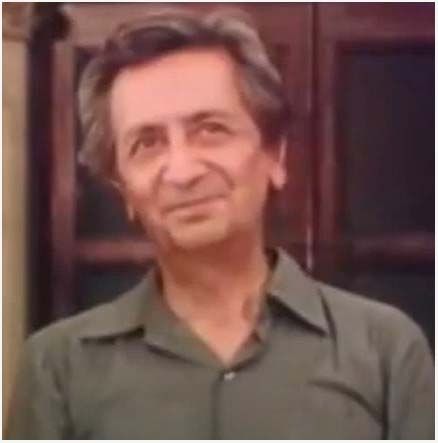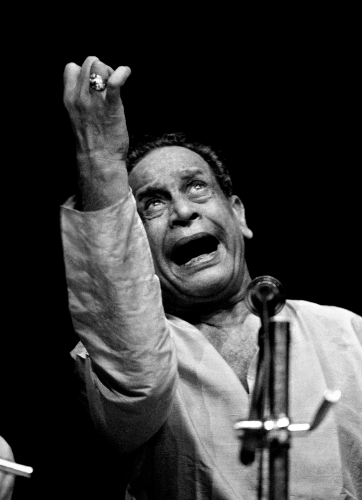Bhisham Sahni

Subscribe to read full article
This section is for paid subscribers only. Our subscription is only $37/- for one full year.
You get unlimited access to all paid section and features on the website with this subscription.
Not ready for a full subscription?
You can access this article for $2 , and have it saved to your account for one year.
- Born: 08/08/1915 (Rawalpindi, Punjab)
- Died: 11/07/2003 (Bombay)
- Primary Cinema: Hindi
A bona fide legend in the world of Hindi literature of India, Bhisham Sahni also left a mark in Indian cinema with the adaptation of his epic Partition novel Tamas by Govind Nihalani. But his connection with cinema does not begin here as he was the brother of the legendary actor Balraj Sahni.
Born on 8 August 1915 in Rawalpindi, Sahni completed his Master’s in English literature from Government College, Lahore before going on to conduct his doctoral research from Panjab University, Chandigarh. From a young age, Sahni was involved in political activism. He became a member of the Indian National Congress during the Partition. The horrors of the Partition left a deep impact on him and he spent his days organising relief work for refugees. His brother was associated with the Indian People’s Theatre Association and he joined them in 1948. Working as an actor and director, he travelled through the towns and villages of Punjab, and his experiences played a significant part in his journey as a writer. He directed a drama Bhoot Gari which would later be adapted for the stage by K A Abbas.
He soon left the Congress and joined the Communist Party. He worked as a lecturer in a college in Ambala, then at Khalsa College, before moving to Delhi to become a lecturer at Delhi Collge under the University of Delhi. He moved to Moscow in 1956, working as a translator for the Foreign Languages Publishing House. He translated Leo Tolstoy’s short stories and the novel Resurrection during his tenure. He returned to India in 1963 as a lecturer in Delhi College again. He also edited an influential magazine Nai Kahaniyan from 1965 to 1967. During his time as a teacher he was involved in the Punjab College Teacher’s Union and the General Secretary of the All India Progressive Writer’s Association from 1975-85).
The work that Sahni is known for is Tamas which is regarded as one of the most important novels ever written. A searing and insightful look into the politics and tragedy of the Partition, the novel won the Sahitya Akademi Award in 1975. He wrote six other Hindi novels - Jharokhe (1967), Kadian (1971), Basanti (1979), Mayyadas Ki Madi (1987), Kunto (1993) and Neeloo, Nilima, Nilofar (2000). He also wrote ten collections of short stories over an incredibly prolific career. He was also a playwright, writing significant dramas such as Hanoosh (1977), Kabira Khada Bazar Mein (1981), Madhavi (1982) and Muavze (1993). He was awarded the Padma Bhushan in 1998 for his contributions to literature. He was also awarded the Sahitya Akademi Fellowship in 2002. Very few writers were as able in bringing the small towns and villages of Punjab and their myriad pains and joys to life as Bhisham Sahni was.
Tamas was adapted by Govind Nihalani into a television film in 1988. It won the Nargis Dutt Award for Best Film on National Integration at the National Film Awards. Nihalani had come across the book while working as the second unit director for Richard Attenborough’s Gandhi (1982). Nihalani later described Sahni as the finest writer in Hindi and always made it a point to visit him when he came to Delhi.
Sahni also co-wrote the screenplay for Kumar Shahani’s Kasba (1991) which was based on Anton Chekhov’s In The Ravine. He also appeared as an actor in a number of films like Mohan Joshi Hazir Ho! (1984), Tamas (1986), Kasba (1991), Bernardo Bertolucci's Little Buddha (1993) and Aparna Sen's Mr. and Mrs. Iyer (2002).
He also penned an autobiography called Aaj Ke Ateet and a biography of his brother – Balraj My Brother. India Post released a stamp in his honour on 31 May, 2017. The legendary writer passed away on 11 July, 2003 in Delhi.
References
Image credit: https://www.youtube.com/watch?v=QEsEuWgIpgg
-
Filmography (2)
SortRole
-
Mr and Mrs Iyer 2002
-







.jpg)



